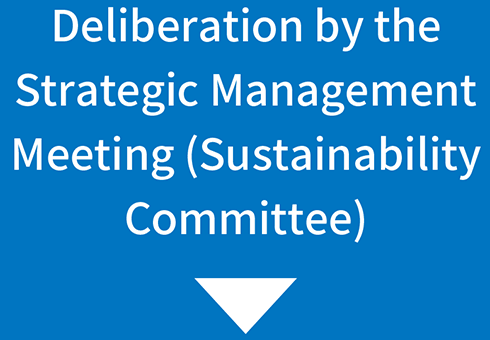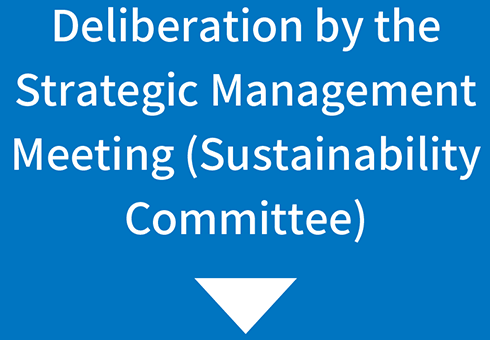UBE Group’s Materiality
In conjunction with the formulation of the new Medium-Term Management Plan, which is in effect from fiscal 2025, the UBE Group has reviewed its Material issues (Materiality) that must be addressed by rallying its overall strength, with the aim of realizing UBE Vision 2030 Transformation –2nd Stage: “A specialty chemicals that contributes to the global environment, human health, and an enriched future society.”
The process of reviewing these Material issues involved the selection of candidates by the Executive Management Study Seminar, with the Strategic Management Meeting deliberating on each. After that, the Board of Directors validated the appropriateness of the newly defined Material issues and passed a resolution to approve them.
Guided by its Founding Principles, Purpose, Corporate Philosophy and Management Principles, which together constitute the UBE Philosophy Framework, the UBE Group is committed to sincerely addressing five Material issues identified across the four key areas described below.
- Growth:
Expanding specialty businesses - Society:
Empowering and engaging a diverse workforce
Occupational safety and health, process safety, and disaster prevention - Environment:
Addressing global environmental issues - Governance:
Upholding integrity and fairness in corporate governance
At the same time, the UBE Group has established KPIs as indicators of its commitment to sustainable management through fiscal 2030. By reviewing progress annually, the Group aims to help address social issues and realize its Vision for 2030.
The process used to identify Materiality
 |
|
|---|---|
   |
|
   |
Goal setting, main initiatives, and KPI review for each Materiality areaGoals were established for each materiality area, along with a review of the main initiatives and corresponding KPIs. |
   |
Approval of MaterialityThe Board of Directors deliberated the defined goals and Materiality, together with the corresponding main initiatives and KPIs, and passed a resolution to approve the finalized Materiality. |
Materiality for UBE


